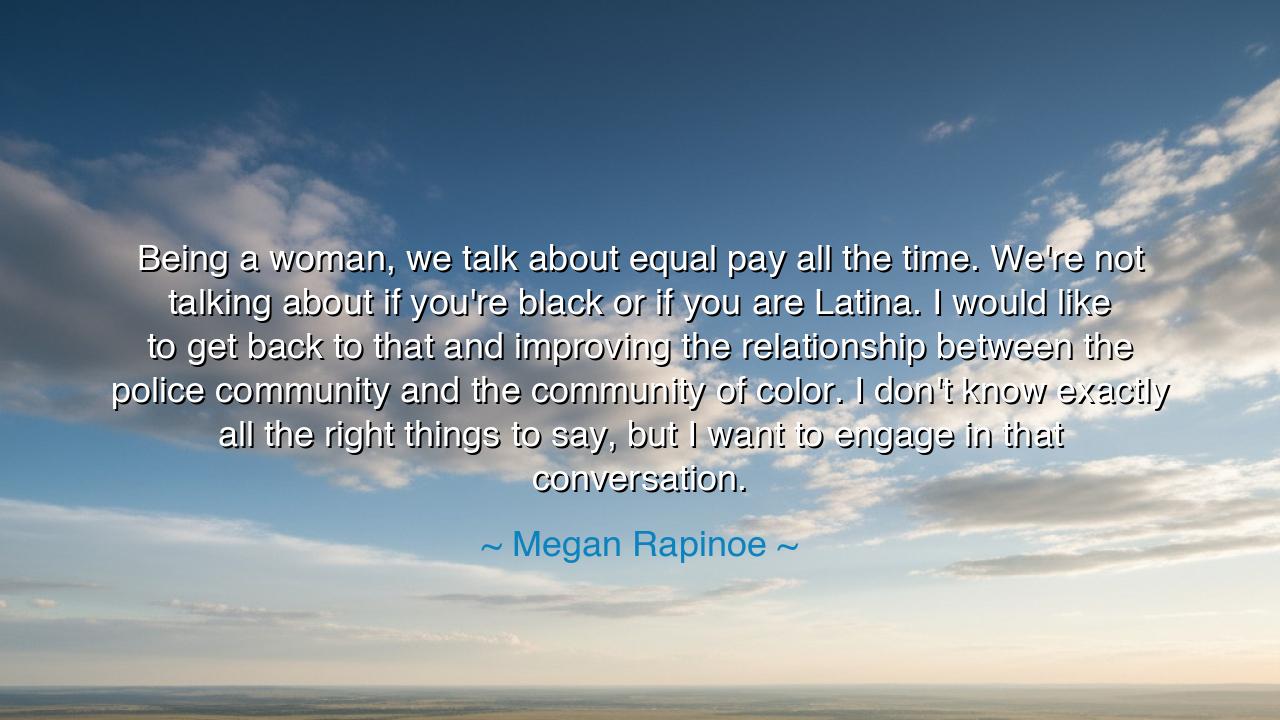
Being a woman, we talk about equal pay all the time. We're not
Being a woman, we talk about equal pay all the time. We're not talking about if you're black or if you are Latina. I would like to get back to that and improving the relationship between the police community and the community of color. I don't know exactly all the right things to say, but I want to engage in that conversation.






When Megan Rapinoe declares, “Being a woman, we talk about equal pay all the time. We’re not talking about if you’re black or if you are Latina. I would like to get back to that and improving the relationship between the police community and the community of color. I don’t know exactly all the right things to say, but I want to engage in that conversation,” she speaks with the courage of one who recognizes the many struggles woven into the fabric of justice. Her words carry the humility of honesty and the fire of conviction, affirming that equality is not singular, but many-sided.
The origin of this reflection lies in Rapinoe’s role not only as an athlete, but as an advocate for justice. She has long fought for equal pay in sport, a battle emblematic of the wider fight for gender equality. Yet here she acknowledges that the struggle does not end with women’s rights alone — it extends into the realms of race, culture, and the often fractured relationship between authority and the marginalized. Thus, her voice calls for unity among struggles, so that none are forgotten.
Her invocation of the police community and the community of color reveals an understanding of the urgent need for healing where trust has been broken. To speak of “improving the relationship” is to dream of reconciliation, where justice is not feared but trusted, and where protection is not clouded by prejudice. She admits her uncertainty in words, yet her desire to join the conversation reflects the ancient wisdom that progress begins not with perfect speech, but with the willingness to listen, to engage, and to learn.
To confess, “I don’t know all the right things to say,” is itself a mark of sincerity. For the path of justice is not walked by those who claim perfect knowledge, but by those who step forward in humility, ready to risk error in the service of truth. Rapinoe reminds us that silence preserves injustice, while even imperfect voices can help shape the chorus of change.
Let the generations to come remember: equality is a vast river with many streams — of gender, of race, of class, of power. To fight for one is noble; to unite them all is greater still. Megan Rapinoe’s words endure as a call to engage boldly in the conversation, to strengthen the relationships that have been broken, and to strive for a justice that embraces every soul.






CDTung Chi Dang
Megan Rapinoe’s quote really makes me think about the disconnect between the issues we talk about publicly and those that truly need attention. While equal pay is essential, I believe she’s right in saying that we need to focus more on the relationship between communities of color and law enforcement. What do you think would be an effective approach to fostering understanding and cooperation between these communities and the police?
KMDuy Khanh Mai
I agree with Megan Rapinoe that the conversation around equal pay needs to include a broader discussion about race. It’s easy to forget how race plays a role in many aspects of inequality. I think it’s time we acknowledge these layers and find ways to unite people of different backgrounds in the fight for equality. How can we ensure that the voices of women of color are included in these important conversations about justice and equality?
KKHuynh Ha Kim Khanh
Megan Rapinoe’s willingness to speak up about both gender and racial issues shows a deep understanding of intersectionality. The fact that she mentions not knowing the exact right things to say makes her even more relatable, because so many of us feel the same way. But how do you think we can make this conversation more open, allowing people to admit they don’t have all the answers while still moving forward?
SBH Ka Sa Bya
It’s brave of Megan Rapinoe to acknowledge that she doesn't have all the answers but still wants to engage in this conversation. I think we often shy away from discussing race and police relations because it feels like an overwhelming issue. But how can we make this conversation more accessible for everyone? What do you think is the first step in improving relationships between the police and communities of color?
T7Phuong Trinh 7A
I really appreciate how Megan Rapinoe brings attention to the complexities of discussing equality. Equal pay is a huge issue, but she’s right that the conversation often overlooks racial and ethnic disparities. It’s so important to talk about how different communities experience inequality in different ways. What steps do you think could help improve relationships between communities of color and the police in a way that feels productive and healing?